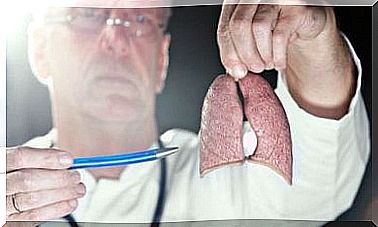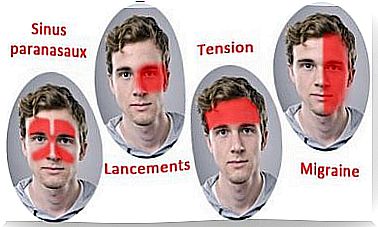6 Nutritional Deficiencies That Can Cause Depression
Did you know that a nutrient deficiency can be the trigger for great emotional imbalances, or even depression? Improve your diet to optimize your state of mind.
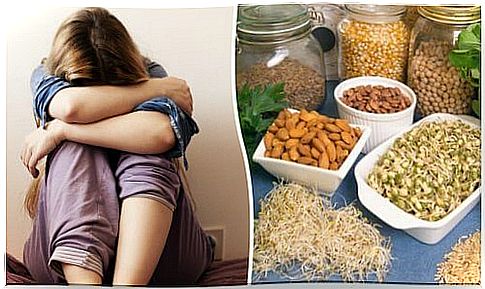
Depression is a disorder that affects the state of mind. It is characterized by the continuous appearance of feelings of sadness and irritability, as well as by a general loss of interest in daily activities and in life in general.
Nowadays, it is considered a public health problem. It is indeed more and more frequent in the world population, in particular in the population of the so-called developed countries.
Until a few decades ago, scientists believed that it was only due to traumatic emotional situations.
However, different studies have shown that depression results from chemical imbalances in the brain, which can be caused by environmental factors and hormonal changes, as well as genetics.
In addition, researchers have been able to determine that depression can be triggered by poor eating habits. Nutrient deficiencies could indeed increase the risk of suffering from it chronically.
It is therefore fundamental to improve our diet and increase our consumption of foods whose nutritional value allows us to avoid and combat this phenomenon.
We will therefore share with you below the 6 nutrient deficiencies that may be related to the development of depression.
Discover them without further delay!
1. A deficiency in omega-3 fatty acids
Foods rich in omega-3 fatty acids bring many benefits to our body, especially from an emotional point of view.
Ingesting it therefore allows us to develop our central nervous system well, to control the inflammations that can affect it and to promote its activity.
These nutrients are also important for balancing the secretion of chemicals in the brain and for reducing the risk of premature aging.
Likewise, it is strongly recommended to consume omega-3 when suffering from depression, because they allow to increase the production of serotonin, while inhibiting that of cortisol, the stress hormone.
Among the foods that contain it, we find:
- Fatty fish
- Seeds and dried fruits
- Dry vegetables
- Eggs
- Certain fruits and vegetables (such as avocado)
2. Vitamin D deficiency
Vitamin D deficiency not only increases the risk of developing bone and joint problems, it can also trigger episodes of depression and dementia.
This vitamin is key in the process of secreting serotonin, a neurotransmitter that is directly related to state of mind and happiness.
Correct absorption of this nutrient reduces the risk of emotional imbalances and, at the same time, helps strengthen the immune system.
Obviously, it is the sun’s rays that give us the most vitamin D. But it is also found in foods such as:
- The blue fish
- Cod liver oil
- Cereals and products fortified with soybeans
- Dairy products
- Eggs
- The mushrooms
3. Zinc deficiency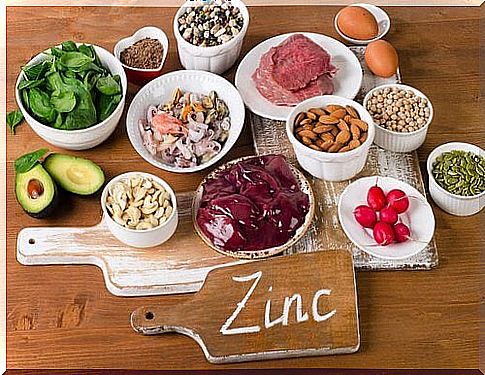
Zinc is another micro-nutrient that helps regulate emotions. Its function is in fact to stimulate certain neuronal functions and part of the activity of our nervous system.
If we consume enough, it helps to increase the production of neurotransmitters for well-being.
At the same time, it is involved in more than 250 independent biochemical channels which are related to the functioning of our major organs.
Foods that can help you with a zinc deficiency are:
- Red meat
- Eggs
- Seafood
- Dry vegetables
- Nuts
- Seeds
- Whole grains
- Organic dairy products
4. Selenium deficiency
This nutrient is essential for good brain function and for keeping the state of mind in check.
It plays an essential role in the functioning of the thyroid gland and it is essential for our good mental health.
It is antioxidant and reconstructive, which allows it to prevent and treat depressive disorder.
Selenium is found in the following foods:
- Lean meats
- The blue fish
- Beans
- Eggs
- Seafood
5. Magnesium deficiency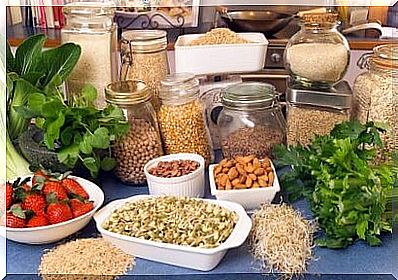
Unfortunately for humans, magnesium is one of the most difficult minerals for our body to absorb.
It is therefore believed that many physical and mental pathologies are related to a magnesium deficiency.
In the treatment of depression, magnesium plays a major role. Not just because it increases the production of serotonin and dopamine, but also because it reduces the production of cortisol.
You should therefore eat more of the following foods if you want to combat a magnesium deficiency:
- Algae
- Almonds
- Lawyer
- Bananas
- Beans
- Pumpkin seeds
- Whole grains
- Oat bran
- Green vegetables
6. Iron deficiency
Iron deficiency is often the cause of health problems such as anemia, mental fatigue and depressive disorders.
Iron is indeed an essential element in the development and functioning of our cognitive and sensorimotor system.
A person who suffers from an iron deficiency does not make enough red blood cells. This therefore affects the oxygenation of its cells and thus increases the risk of suffering from emotional imbalances, mental fatigue and confusion.
To increase your iron intake, eat:
- Red meat
- Red beets
- Spinach and green vegetables
- Blue fish
- Pomegranates
- Eggs
- Oatmeal
- Beans
- Peanut butter
Combating a deficiency can therefore be essential for a person who suffers from depression and who is trying to cure themselves.
However, it is necessary that it takes into account all the potential causes of this disease to flush out its true origins and take all the necessary measures to cure it.



